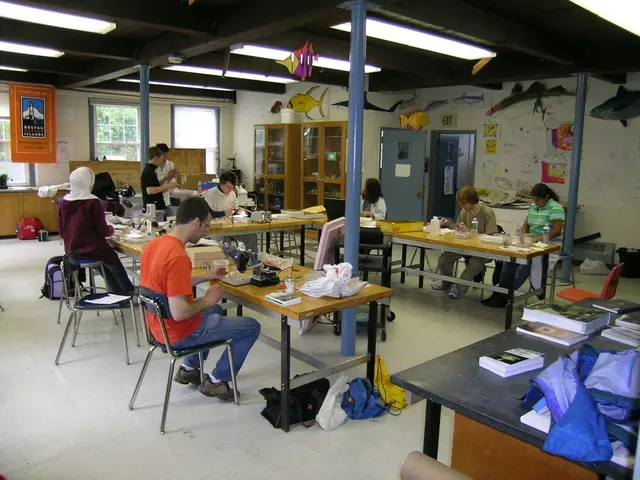Collaborative Effort to Alleviate Skilled Labor Deficit: Additional Backing for Related Ventures
The Osnabrück region is taking proactive steps to combat the skilled worker shortage, with the Regional Skilled Workers Alliance Northwest receiving funding under the ESF+ guideline "Support for regional skilled workers alliances." This alliance, recognised by the Lower Saxony Ministry of Social Affairs until August 31, 2027, is dedicated to developing and retaining skilled workers, particularly in sectors facing shortages.
One innovative approach being considered is the launch of **dual study programs** that combine academic and practice-integrated phases. Inspired by pilot projects like "QuaWiDual" in Baden-Württemberg, these programs could effectively prepare skilled workers, especially in STEM and vocational education sectors. By shortening preparatory service periods and facilitating smoother entry into professional roles, these programs aim to counteract skilled labor shortages in high-demand fields such as mathematics, computer science, physics, electrical engineering, and IT.
Another promising idea is the development of **training programs focused on renewable energy, green technologies, and sustainability**. As the world moves towards a greener economy, this approach can attract workers and ensure future-proof careers. Collaborations with local businesses and training providers on apprenticeships, bootcamps, and reskilling pathways—especially for mid-career changers—would enhance workforce adaptability.
The alliance also supports **interdisciplinary training** that equips workers with regulatory and innovation skills. This approach, following Osnabrück University’s example of offering a Master of European Technology Law, supports innovation without regulatory delays, enhancing retention by providing workers with "future skills" aligned with emerging industry needs.
Funding for these innovative projects can be sought from various sources. State ministries, such as the Ministry of Science, Research and the Arts, support pilot educational programs with substantial grants. European Union programs and networks, like Cedefop, provide frameworks and potential resources for vocational education and training projects aimed at workforce development across European regions. Partnerships with private sector stakeholders invested in sustainable growth could leverage private investment funds, similar to the £60 billion backing offshore wind jobs in the UK.
Interested project carriers are encouraged to approach the alliance with their ideas and projects. Projects must meet minimum requirements such as innovation, networking, regional and specific needs, and broad regional impact in at least two administrative bodies of the alliance. Successfully implemented projects include the platform www.ausbildungsregion-osnabrueck.de, which offers current information and practical help for the transition from school to working life. Further information on the application process can be found on the page www.fkb-nordwest.de.
The alliance covers the sub-regions "South" (districts and city of Osnabrück), "Center" (districts of Cloppenburg, Diepholz, and Vechta), and "North" (districts of Oldenburg, Ammerland, and cities of Oldenburg and Delmenhorst). The Job Center of the district of Osnabrück and WIGOS are taking measures to counter the trend of the district of Osnabrück experiencing a shortage of skilled workers. The funding for measures to counter the skilled worker shortage in the Osnabrück region depends on content orientation and target group.
The Regional Skilled Workers Alliance Northwest encourages creative and innovative ideas to benefit the region and improve the skilled worker situation sustainably. With a budget available until August 31, 2027, the alliance is poised to support projects that address current challenges in the regional skilled worker situation and implement long-term strategies for skilled worker development and retention.
- To strengthen personal growth and career development, the Osnabrück region is considering the launch of dual study programs that combine academic and practical phases, focusing on high-demand fields like mathematics, computer science, physics, electrical engineering, and IT.
- As a part of the regional initiative to combat the skilled worker shortage, the development of training programs focused on renewable energy, green technologies, and sustainability is underway. This approach aims to attract workers, ensure future-proof careers, and enhance workforce adaptability.








